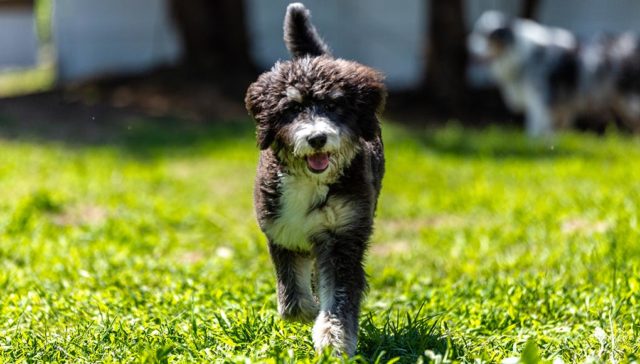
Table of Contents
- 10 Best Mixed-Breed Dogs for First-Time Owners
- 1. Bernedoodle (Bernese Mountain Dog and Poodle Mix)
- 2. Cavachon (Cavalier King Charles Spaniel and Bichon Friese Mix)
- 3. Cockapoo (Cocker Spaniel and Poodle Mix)
- 4. Goldador (Golden Retriever and Labrador Retriever Mix)
- 5. Goldendoodle (Golden Retriever and Poodle Mix)
- 6. Labradane (Labrador Retriever and Great Dane Mix)
- 7. Labradoodle (Labrador Retriever and Poodle Mix)
- 8. Maltipoo (Maltese and Poodle Mix)
- 9. Peekapoo (Pekingese and Poodle Mix)
- 10. Shorkie (Shih Tzu and Yorkshire Terrier Mix)
- Frequently Asked Questions About Mixed Breed Dogs for First-Time Owners
- Best Mixed-Breed Dogs for First-Time Owners Final Thoughts
Are you thinking about adopting a mixed dog breed?
Is this your first time owning a dog as well?
No worries!
We’re here to give you a sneak peek at the best mixed-breed dogs for first-time owners.
Is there anything one should do before adopting?
Besides preparation, one should research first and even check things considering the dog’s needs.
Remember when adopting a dog, several things should be considered first: lifestyle, home size, family setting, time, and even budget.
Adopting a dog isn’t just a one-time thing and should be dealt with responsibly. As first-time owners, it’s best to take on commitment that we are sure about.
First-time owners of dog breeds that are in the companion category is best since their temperament is much easier to match and understand.
Utility dogs may require leadership that’s already experienced and established and that may not be easy for first-time owners.
No worries, we prepared a list of mixed dog breeds that are best for first-time owners!
Shall we? Here are the mixed dog breeds perfect for first-time owners:
10 Best Mixed-Breed Dogs for First-Time Owners

1. Bernedoodle (Bernese Mountain Dog and Poodle Mix)
Height: 23 – 29 inches
Weight: 70 – 90 pounds
Lifespan: 12 -18 years
Temperant
The first on our Best Mixed Breed Dogs for First-Time Owners list is the Bernedoodle. Bernedoodle was bred as a companion dog.
From it's origin breed, Bernedoodles picked up the affectionate, playful, energetic, and intelligent aspects.
Bernedoodles are highly intelligent and first-time owners may be challenged with training but Bernedoodles quite follow well with their owners as they are also eager to please them.
With Bernedoodle’s friendly and easy-going temperament, this can be suitable practice and challenge for first-time owners.
Bernedoodles do amazing in outdoor activities and even cuddle on the sofa after.
Possible Health Problems
Although Bernedoodles are much healthier than Bernese Mountain Dogs, they’re still prone to some diseases. Below are the ones owners should look out for:
- Allergies
- Ear Infections
- Elbow & Hip Dysplasia
- Epilepsy or seizures
- Eye Problems

2. Cavachon (Cavalier King Charles Spaniel and Bichon Friese Mix)
Height: 12 – 13 inches
Weight: 15 – 35 pounds
Lifespan: 10 -15 years
Temperant
Although their way of approaching it is being confused vocally, Cavachon’s curiosity is quite fun to witness on your own.
Cavachons are amazingly friendly, no matter if it’s a human or a dog or maybe even other animals!
Cavachons are one of the best-mixed dogs for first-time owners as they are highly trainable, friendly, and active too.
This can help owners gradually bond and establish a leader-companionship relationship as Cavachons respond well to positive training.
They’re also a breed that doesn’t need an extensive exercise regimen, rather a brisk walk or playtime indoors is ample.
Cavachons need early socialization too, so they can be the friendly as they ought to be.
Possible Health Problems
Cavachon may inherit several diseases from its original breed. These are the following to look out for:
- Adenomas
- Atopic Dermatitis
- Arthritis
- Collapsing Trachea
- Eye Problems
- Dental Disease
- Obesity
- Patellar Luxation
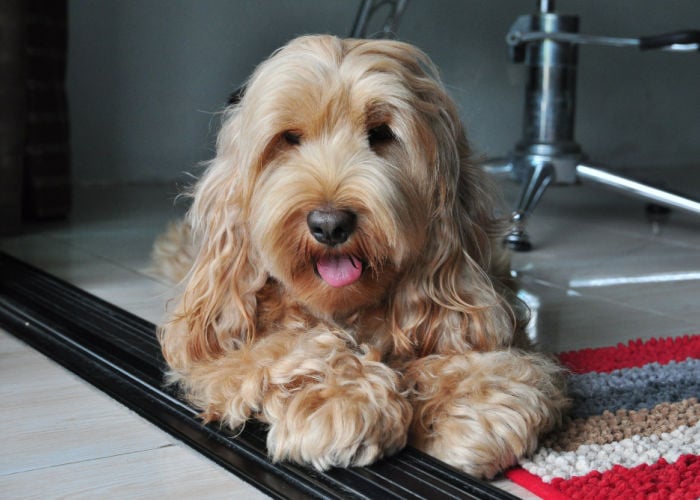
3. Cockapoo (Cocker Spaniel and Poodle Mix)
Height: 10 – 15 inches
Weight: 6 – 19 pounds
Lifespan: 12 -15 years
Temperant
For first-time owners who are looking for friendly temperament mixed breeds, Cockapoo is the answer! The cockapoo must be one of the friendliest breeds out there.
Not to mention they are amazing with families and children too! Strangers and other dogs don’t need to be scared.
A little introduction will make its way to a Cockapoo’s heart in a heartbeat.
Cockapoos will do well with first-time owners as they are naturally friendly and active with the help of basic training and early socialization.
Owners can readily benefit from this temperament even more. Cockapoos do have velcro temperament tendencies.
So crate training must also be introduced! Grooming for Cockapoos may require a bit of effort such as daily brushing to avoid matting for their curly hair.
Other than that, Cockapoos are quite manageable for first-time owners!
Possible Health Problems
Cockapoos may have inherited some diseases from their original breed. These are the following to look out for:
- Cataracts
- Epilepsy
- Heart Diseases
- Hip Dysplasia
- Patellar Luxation
- Progressive Retinal Atrophy
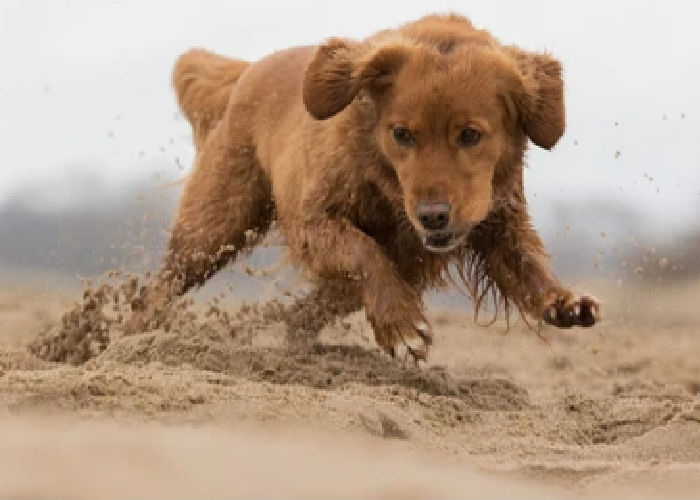
4. Goldador (Golden Retriever and Labrador Retriever Mix)
Height: 22 – 24 inches
Weight: 60 – 80 pounds
Lifespan: 10 -15 years
Temperant
This mix is quite prominent already as the two separate breeds are known to be one of the friendliest dog breeds.
Goldador is known for their playful, energetic, and friendly personality. Both of their origin breeds is almost the same temperament too.
Goldadors are active and love to be utility dogs. Goldadors, like their original breed, love to work and work for their owner.
They thrive in showing their love through the results of their work.
Goldador is fond of their owners and families, and they do well with children too. Goldadors aren’t as vigilant to strangers but once they sense danger, they will respond accordingly.
They’re also quite friendly with other animals, especially when exposed when they’re young.
Goldadors do amazing with active families as they’re very dynamic dogs that need a lot of exercises daily.
Possible Health Problems
Goldadors are quite large. Similar to large dogs, they are prone to a couple of diseases. Owners should look out for the following:
- Cataracts
- Diabetes
- Elbow and Hip Dysplasia
- Progressive Retinal Atrophy
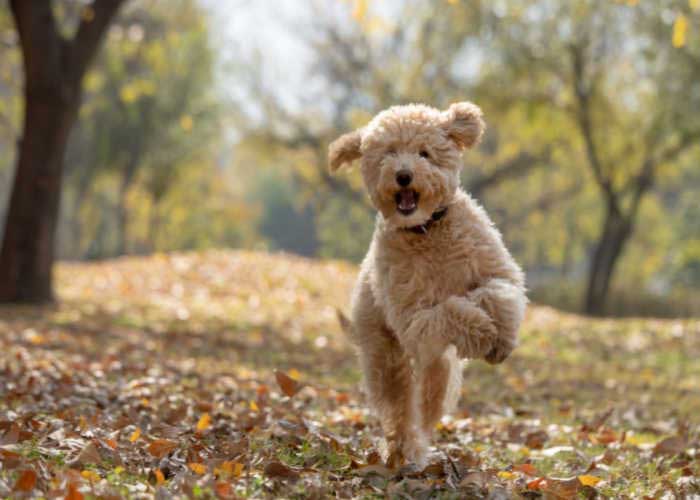
5. Goldendoodle (Golden Retriever and Poodle Mix)
Height: 17 – 15 inches
Weight: 50 – 90 pounds
Lifespan: 10 -15 years
Temperant
Even if they’re large, Goldendoodles win the heart. Goldendoodles have one of the best temperaments out there in terms of being a companion dog, even then they’re also great as service dogs.
They’re great with their owners/ families, children and even with new people!
They may need a little introduction to new dogs but that’s only fair as they’re mistaken to be intimidating with their size.
They’re also relatively easy to groom as they don’t shed too much but may need trimming and brushing now and then.
They’re easily trained as well and even respond well to positive reinforcement and praise.
First-time owners also get to enjoy witnessing these flowy creatures in action!
Possible Health Problems
Goldendoodles are quite large, similarly to large dogs they are prone to a couple of diseases. Owners should look out for the following:
- Atopic Dermatitis
- Hip Dysplasia
- Patellar Luxation
- Progressive Retinal Atrophy
- Seizures
- Von Willebrand’s Disease
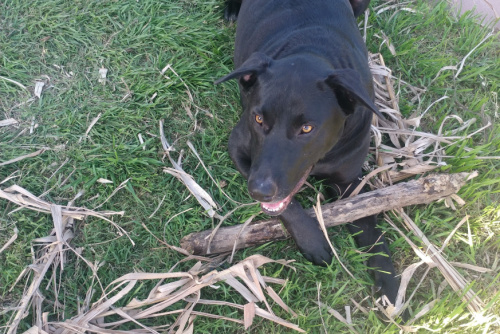
6. Labradane (Labrador Retriever and Great Dane Mix)
Height: 24 – 30 inches
Weight: 100 – 180 pounds
Lifespan: 8 -12 years
Temperant
If first-time owners are looking for a family dog with a bright and affectionate personality, Labradane might just be the perfect one!
Labradanes are extremely affectionate and friendly with their family members and would protect them.
Hilariously Labradane has a lack of self-awareness in regards to their size.
They may sit on anyone’s lap regardless of who is in the family, so a little supervision around children will be needed.
Other than that, Labradane’s are perfect for houses with yards and family-setting kinds of homes. Labradanes have velcro tendencies and thrive on human interaction.
So if first-time owners are looking for a dog that would stay by their family all the time, Labradane is just perfect!
Possible Health Problems
Labradanes are relatively healthy breeds but here are some:
- Bloat
- Elbow and Hip Dysplasia
- Panosteitis
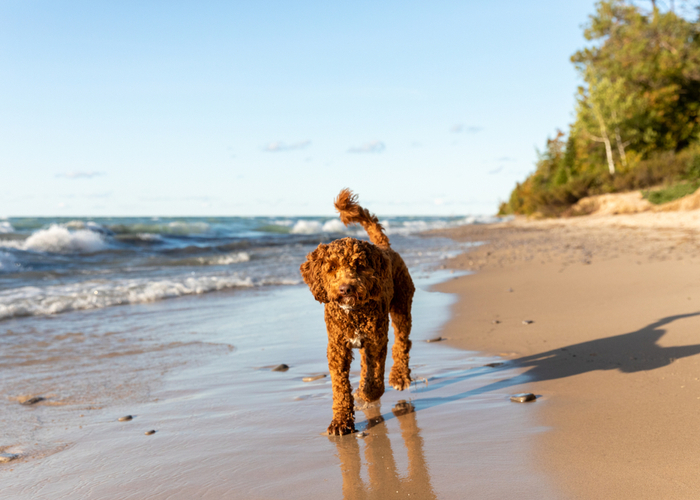
7. Labradoodle (Labrador Retriever and Poodle Mix)
Height: 21 – 24 inches
Weight: 50 – 65 pounds
Lifespan: 12 -14 years
Temperant
Both Labrador Retriever and Poodle are fur buddies that are in love with water. Labradoodles are known for their playful, energetic, and friendly personalities.
Labradoodles are very fond of their owners or families and will love to spend most of alongside them. They do well with children too.
Labradors aren’t as vigilant to strangers but once sense danger they will respond accordingly.
They’re pretty friendly with other animals as well, especially when exposed when they’re young.
Labradors do amazing with active families as they’re very dynamic dogs that need a lot of exercises daily.
Possible Health Problems
Labradoodles may have inherited some of the diseases. Owners should look out for the following:
- Allergies
- Diabetes Mellitus
- Ear Infections
- Epilepsy
- Elbow, Hip, or Joint Dysplasia
- Idiopathic Epilepsy
- Progressive Retinal Atrophy
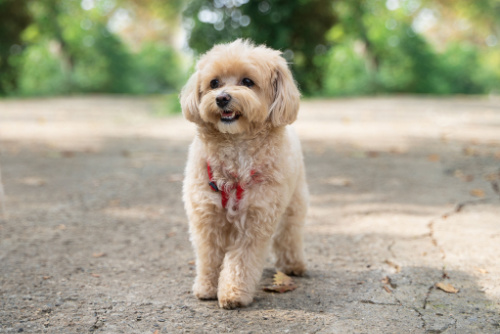
8. Maltipoo (Maltese and Poodle Mix)
Height: 8 – 14 inches
Weight: 5 – 20 pounds
Lifespan: 10 -13 years
Temperant
Maltipoo may be the ultimate lapdog. Maltipoo is chill and friendly but surprisingly they are great as alarm dogs too!
Don’t let the size fool you. They will jerk and vocal out their heart's content if they feel unsafe in a certain situation or with a stranger.
Maltipoos enjoy cuddling with their owners and even a round of fetch.
Maltipoos are easygoing that's why they would be great with first-time owners. They’re great with families and good with children too but, of course, all of that would be easier with early socialization and basic training.
Possible Health Problems
Some Malitpoos were bred without undergoing to necessary tests and screening. These are some of the diseases owners should look out for when adopting a Maltipoo:
- Epilepsy
- Hip Dysplasia
- Legg-Calve-Perthes Disease
- Patellar Luxation
- Portosystemic Shunt
- Progressive Retinal Atrophy
- White Shaker Syndrome
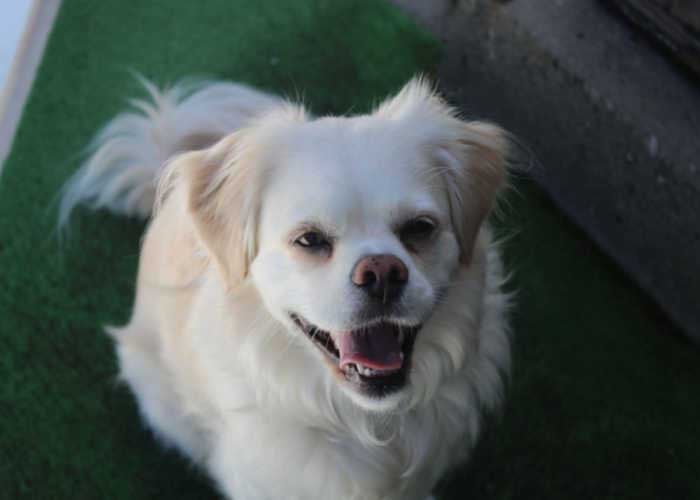
9. Peekapoo (Pekingese and Poodle Mix)
Height: 6 – 11 inches
Weight: 4 – 20 pounds
Lifespan: 10 -15 years
Temperant
If first-time owners are looking for a much more chilled dog with a hint of being couch potatoes, Peekapoo is the one for you.
For those who are at home most of the time and go out once in a while, Peekapoo is a great addition to your mix.
Peekapoos are natural lapdogs and companion dogs. They’re quite friendly and sensitive too.
They love their owners and family but will feel the need to be wary around new people that come.
They’re okay with other dogs and animals that have the same energy as them and may dislike the excessive energy of others.
Peekapoos are highly intelligent too so instead of extensive exercises, mentally stimulating activities are more of their cup of tea.
Peekapoos will do well in apartment living too or even in big homes.
Possible Health Problems
Some Peekapoos may inherit diseases from their original breed depending on the breeding generation. Here are some of the diseases owners should know:
- Brachycephalic Obstructive Airway Syndrome
- Eye Problems
- Dental Diseases
- Legg-Calve-Perthes Disease
- Patellar Luxation
- Progressive Retinal Atrophy

10. Shorkie (Shih Tzu and Yorkshire Terrier Mix)
Height: 6 – 14 inches
Weight: 5 – 15 pounds
Lifespan: 10 -16 years
Temperant
Shorkies are great apartment dogs.
They do great with single owners or even families, but they tend to be closer to the ones who care for them the most.
Shorkies are balls of energy.
They will do well with first-time owners but may need to extend their efforts more than usual.
Despite their small size, their energy is explosive if not released well. Shorkies' exercise can be split into the day.
So that they can release their energy for the day and lessen explosive energy in the household.
They’re also quite attentive to their surroundings and that makes them a great watchdog.
First-time owners may need a little persistence to tame this tiny ball of energy but it’s worth it.
Possible Health Problems
While Shorkies are healthier than their original breed some Shorkies may still inherit the disease. Here are some common problems they may suffer from:
- Cushing’s Disease
- Dental Disease
- Obesity
- Patellar Luxation
- Respiratory Problems
- Spinal Disc Disease
Frequently Asked Questions About Mixed Breed Dogs for First-Time Owners
Are mixed breeds best for first-time owners?
Yes, many mixed breeds are great with first-time owners. Adopting mixed breeds may be intimidating for some but with research and consulting the veterinarian, it can go a long way.
First-time owners can even ask the shelter about the behavioral habits of the dog to check if it fits the owner’s lifestyle.
Adopting will require effort from both the dog and the owner. Compromising is the key!
Should I get a Mixed Breed Dog?
Mixed breed dogs are generally healthier than their purebred friends. Mixed breeds are known for a lower percentage of acquiring diseases from their origin breeds.
Most temperaments are also varied so instead of having a highly vigilant temperament, it may be mixed or modified into a more calm manner depending on the origin breed.
What dog breeds are best for first-time owners?
There are dozens of dog breeds that are known to be the best for first-time owners. It will all depend on the different purposes and sizes.
Here are some honorable mentions for dog breeds that are known to be best for first-time owners:
- Bernese Mountain Dog
- Bichon Frise
- Cavalier King Charles spaniel
- Golden Retriever
- Great Dane
- Labrador Retriever
- Papillon
- Poodle
- Pugs
- Shih Tzu
- Whippet
- Yorkshire Terrier.

Best Mixed-Breed Dogs for First-Time Owners Final Thoughts
Mixed dog breeds are becoming more prominent as years go by. If you're looking for the best mixed-breed dogs for first-time owners, you should do your research well.
From the dog’s size, exercising and training needs, environmental needs along with the owner’s lifestyle, time, home-setting, and budget, one should research and reconsider if both will fit well.
Adopting a dog requires accountability and responsibility that shouldn’t be taken lightly.
Remember to avoid adopting a dog from a puppy mill or irresponsible breeders. Adopt a dog from a reputable breeder instead.
Don’t forget to have the dog tested and screened for any disease it may have inherited to avoid further problems in the future.












